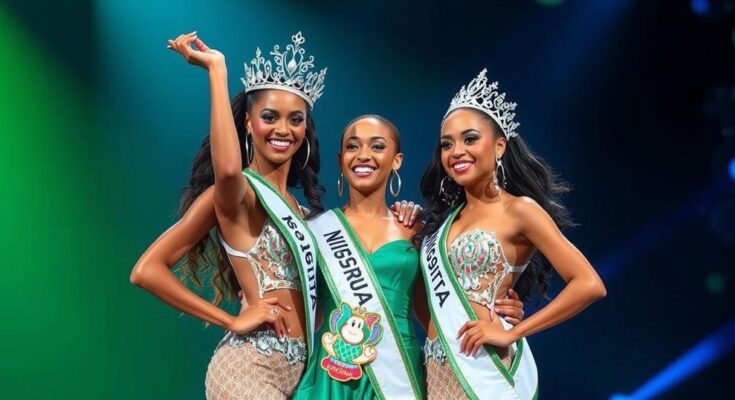Chidimma Adetshina, representing Nigeria, earned recognition as the first runner-up in the Miss Universe contest and was named Miss Africa and Oceania. Despite facing trolling and identity controversies in South Africa, she expressed pride in her achievements and emphasized her dual heritage. She is the highest-placing black African contestant since 2019. Adetshina plans to seek mental health support following the trolling she experienced after the competition.
Chidimma Adetshina, representing Nigeria, has expressed immense pride after finishing as first runner-up in the Miss Universe competition, in addition to being named Miss Africa and Oceania. Despite facing xenophobic backlash and personal challenges in her journey, she remained steadfast, stating, “I am so proud of myself and I just made history,” shortly after the contest, where she was narrowly defeated by Miss Denmark, Victoria Kjær Theilvig. Originally from South Africa, Adetshina entered the Miss South Africa contest but faced trolling due to her Nigerian heritage. Recently, the South African government announced potential actions against her identity documents, following allegations regarding her mother, although both Adetshina and her mother have refrained from addressing these claims. Given the uncertainty surrounding her identity, she contested in Miss Nigeria and won, securing her position in the prestigious Miss Universe event held in Mexico City. The current Miss South Africa, Mia le Roux, who is noted for being the first deaf woman to hold the title, withdrew from the Miss Universe competition due to undisclosed health issues. Chidimma Adetshina, a dedicated law student, remains proud of her dual heritage and stated in a previous interview, “I still see myself as proudly South African and proudly Nigerian.” Her performance marks a remarkable achievement, as she is the highest-ranking black African contestant in Miss Universe since Zozibini Tunzi’s victory in 2019. However, her journey has not been without its challenges. Following her commendable accomplishment, she disclosed plans to seek therapy to address the emotional distress resulting from trolling. The Miss Universe South Africa organization publicly celebrated her achievements, displaying Nigerian and South African flags, yet some South Africans expressed discontent regarding her representation.
The narrative surrounding Chidimma Adetshina unfolds amid ongoing discussions about identity, nationalism, and representation within beauty pageants. As a prominent figure in the Miss Universe competition, Adetshina’s mixed heritage has sparked debates on cultural representation, particularly in the context of South Africa and Nigeria. The recent events leading to her decision to participate as Miss Nigeria were influenced by allegations against her mother’s citizenship and the reaction of South African authorities. This situation illustrates the complexities individuals face in navigating personal identity and national skepticism in competitive arenas. Adetshina’s achievement is significant, depicting a blend of cultural pride while also spotlighting the need for support for individuals facing public scrutiny and trolling. Such issues correlate with wider societal trends concerning race, identity, and the challenges faced by individuals in the public eye.
Chidimma Adetshina’s journey as Miss Nigeria and her impressive performance at Miss Universe serves to highlight themes of resilience amidst adversity. Her pride in her achievement, despite the overwhelming challenges posed by xenophobic sentiments and identity disputes, sets a remarkable example. Furthermore, her experience underscores the necessity of mental health support for those subjected to public scrutiny. This event not only amplifies issues of cultural duality but also marks a historic moment in the representation of black African women in beauty pageants, thereby fostering greater dialogue in the beauty industry.
Original Source: www.bbc.co.uk




